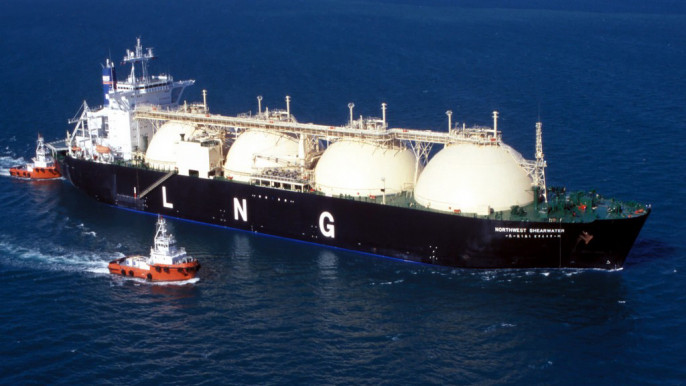As a result of escalations in the Red Sea, several major shipping firms have opted to halt their activities in the area, rerouting their vessels on the lengthier journey around the Cape of Good Hope in South Africa.
Energy giant Edison will be getting regular supplies of Qatari liquified natural gas after it rescheduled its delivery dates from Qatar until the end of April, in an attempt to avoid the Red Sea, its CEO said on Tuesday.
The shipments are set to be delivered via the Cape of Good Hope, Nicola Monti said.
Since Israel waged its genocidal war on Gaza, Yemen’s Houthis have been targeting commercial shipping in the region that they deem to have connections to Israel or are en route to Israeli ports, as part of a movement started by the group in a show of solidarity with Palestine.
This has forced shippers to steer clear of one of the world’s most crucial trade routes.
The alternative elongated route around the Cape of Good Hope on the southern tip of Africa has appended more than 6,500 km to the journey and close to a half-month of sailing time to each trip, sending shipping costs.
Liquified natural gas export giant Qatar alerted Edison in January about the need for an alternative route due to the situation in the Red Sea that began back on October 19.
Monti detailed that Edison adapted to the new circumstances, overcoming hurdles encountered during an expected February delivery at the Italian port of Rovigo.
“All deliveries for February, March and April are confirmed and have been rescheduled according to the new route cargoes have to follow due to … poor security … in the Red Sea,” Monti told Reuters.
Shipments are compelled to circumnavigate Africa.
“So far … we have only had one cancellation, which has already been made up over the past month,” he said.
Monti hoped for a return to business as usual trade flows post-April, emphasising that Edison maintains close communication with Qatar regarding logistical matters.
In January, Qatar issued a warning about the impact on its deliveries due to the Houthi attacks linked to Israel’s genocide in Gaza. The escalating tensions forced Qatar to reroute shipments, affecting the schedule of its LNG deliveries.
“QatarEnergy confirms that Qatar’s LNG production continues uninterrupted, and our commitment to ensuring the reliable supply of LNG to our customers remains unwavering while the ongoing developments in the Red Sea area may impact the scheduling of some deliveries as they take alternative routes,” state-owned QatarEnergy said on January 24.
“LNG shipments from Qatar are being managed” with its buyers, the statement added.
As tensions in the region escalated, Houthis expanded their assaults, indicating intentions to include the targeting of American and British ships. The U.S. and the UK have responded with rounds of airstrikes targeting suspected Houthi sites.
Until now, Houthi operations have primarily focused on the confined Bab el-Mandeb strait, linking the Gulf of Aden to the Red Sea.
This crucial waterway sees about 50 ships traverse it daily, navigating to and from the Suez Canal — a pivotal route for worldwide maritime commerce.
The Houthi group asserts it is acting in solidarity with Palestinians and maintains that they are attacking the vessels to pressure Israel to end its genocide in Gaza and relax restrictions on humanitarian aid supplies intended for Palestinians.







